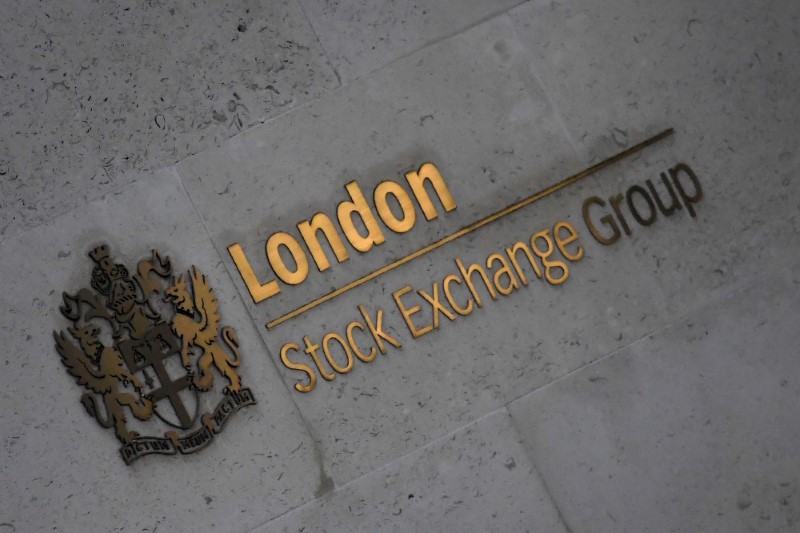By Marc Jones
LONDON (Reuters) - Global markets experienced a slight bout of weakness on Tuesday as traders cashed in on recent record highs, awaited a long-anticipated U.S.-China trade deal and began to digest the first Wall Street earnings of the new year.
It was smooth sailing in Asia; MSCI's world stocks index set a new record high after reassuring Chinese data and Washington had said it no longer deemed Beijing a currency manipulator. But Europe's session saw the currents turn.
Dealers struggled to put their finger on the exact cause but London, Frankfurt and Paris all saw an early wobble which left the regional STOXX 600 (STOXX) down as 0.5%, and bonds and other safe-haven assets suddenly back in demand. [GVD/EUR]
"You had some good news in terms of China coming off the list of currency manipulators and so you would have expected bond prices to extend losses," said Andy Cossor, a rates strategist at DZ Bank in Frankfurt.
"So, I think it might be a case that people got ahead of themselves yesterday and are covering short positions."
Wall Street futures weren't look any brighter either. The S&P 500, Dow and Nasdaq were all expected to open lower, though quarterly earnings from U.S. banks JPMorgan (N:JPM), Citigroup (N:C) and Wells Fargo (N:WFC) were starting to be digested. (N)
A number of heavyweight emerging-market currencies were on the ropes too. The highly-sensitive South African rand hit a three-week low and Turkey's lira took its biggest tumble since mid-December as it dropped 0.4%. [EMRG/FRX]
China's yuan also backed off, having hit its highest level since July overnight after the U.S. Treasury Department said it had removed the currency manipulator tag it had imposed on the country in August.
Beijing had done its part by fixing the yuan's official level at its firmest level in more than five months. It has also pledged to buy almost $80 billion more of U.S. manufactured goods over the next two years and more than $50 billion of energy supplies, according to a source briefed on the trade deal.
The moves coincided with the arrival of a Chinese delegation in Washington ahead of Wednesday's scheduled signing of the Phase 1 trade agreement, seen as calming a dispute that has upended the world economy.
"There have been a number of false starts," said Vishnu Varathan, head of economics at Mizuho Bank in Singapore, of the expected deal signing.
"The fact that this is really coming to the moment when the rubber hits the road is the most tangible evidence of traction in starting to resolve issues."
In contrast to Europe's dip, Japan's Nikkei (N225) had added 0.7% overnight to hit its highest level in a month. Australian shares rose by the same margin to close at a record (AXJO)
Hong Kong's Hang Seng (HSI) and Shanghai blue chips (CSI300) also hit multi-month peaks before running out of steam.
NEW SEASON
In reaction to the pull-back in risk appetite, gold climbed up off a two-week low although it was still around 0.2% weaker for the day at $1,543 per ounce. [GOL/]
Ten-year U.S. Treasury note yields (US10YT=RR), the benchmark for risk-adverse fixed income markets also rallied, dropping roughly three ticks to 1.835% compared with the 1.863% they had touched in Asia.
In currency markets, the Japanese yen stabilised near 110 yen-per-dollar, while another safety play, the Swiss franc, hit its highest level against a lifeless euro since 2017 and rose 0.4% against the dollar. [/FRX]
In contrast to China, Washington slapped the currency manipulator tag on Switzerland on Monday.
Besides the expected trade deal, investors are also looking to U.S. inflation data due at 1330 GMT, with consensus expectations for it to hold steady at 0.2% in December.
At the beginning of the fourth-quarter U.S. company results season, JPMorgan posted what looked to be, at first reading, a better-than-expected rise in quarterly profit, as strong results at its trading and underwriting businesses offset weakness in consumer banking.
Consumer lending is expected to propel profits for big U.S. banks is the results this week, though stress in corporate lending and uneven capital markets may cast a shadow.

(Additional Reporting by Tom Westbrook in Singapore and Dhara Ranasinghe in London, Editing by William Maclean and Pravin Char)